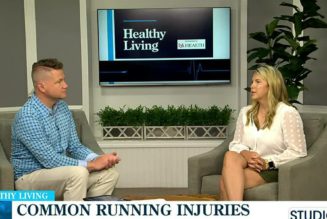
Winter weather makes your heart work harder. If you’re an older adult or live with a heart condition, your risk for heart problems is higher during winter. There are simple ways to winterize your heart and reduce your risk of cardiac problems as it gets colder outside.
-
Heart attacks and other cardiac problems increase during winter months.
-
Older adults and those with chronic health issues are at the highest risk for worsening cardiac problems during winter.
-
Factors like cold air and changes in pressure, humidity, wind, and pollution are part of the problem.
-
A mixture of other issues, like holiday celebrations, fitness levels, changes in activity, mental health, dehydration, and infections, contribute to a perfect winter storm.
-
Know your risks and safety tips before heading to a holiday party, shoveling snow, throwing snowballs, or taking a ski trip.
Studies and healthcare providers worldwide agree that winter weather increases heart attacks and other cardiac problems. With heart disease as the world’s top killer, cold weather prevention is a global task.
Winter weather and activities make your cardiovascular system work harder. Younger and healthier hearts face the extra work without trouble, but older, damaged, or weaker hearts may lack the strength and reserve.
Know your winter risks and safety tips to protect your heart as the cold settles in.
Why do more heart attacks occur in the winter?
Winter weather presents a mixture of cold air and changes in pressure, humidity, wind, and pollution. But scientists aren’t exactly sure which environmental factors are the biggest culprits.
Colder temperatures are certainly a significant factor. When you’re cold, your heart works harder to keep you warm. Your blood pressure increases and your blood vessels narrow to conserve heat. Studies also suggest your cholesterol levels may be higher in the winter, and blood clots may form more quickly.
These changes in the body and the weather are like a sudden workout for the heart. This extra work is harder for anyone with a known heart condition, such as heart failure, an irregular heartbeat, high blood pressure, and blocked or hardened arteries (atherosclerosis). In addition, people who move less during the winter face a higher risk of dangerous blood clots throughout their bodies, including their hearts.
Research also suggests that the weather isn’t the only risk during the winter. Age, fitness, diet, hydration, infections, and mental wellness impact cardiac health, too.
These factors are more difficult to manage during the busy holiday season. At the same time, winter activities like skiing and snow shoveling add to the workload.
Winter can be a perfect storm that stresses the heart.
How to be heart smart during the winter
Being heart-smart starts with knowing your personal risks. If you’re over 65 years old or have a heart condition, your risk is higher than younger adults. However, if you don’t exercise, eat a heart-healthy diet, and are chronically dehydrated or stressed, you’re at risk, too, even if you’re younger than 65. Despite individual risks, heart-healthy smart tips are available for everyone facing cold, wintery weather.
1. Stay warm
To reduce your heart’s workload, wearing warm clothes gives every heart a break. Older adults lose body heat faster, so staying warm is even more crucial. Simple items like warm hats, long underwear, gloves, and wool socks may keep you out of the hospital.
2. Protect yourself from infections
Protect yourself from the flu and other infections. You can boost your immune system with good sleep, a healthy diet, hydration, immune-boosting vitamins, and perhaps the flu shot.
3. Stay hydrated
Studies show that dehydration stresses the heart. A good rule of thumb is to drink a glass of water nearly every hour during the day. However, water needs vary with lifestyles and medical situations. Consult your doctor about your individual needs.
4. Keep your vitamin D levels high
Be sure your vitamin D levels are adequate. Studies show vitamin D is essential to cardiovascular health. Still, most people in the United States, Europe, and the United Kingdom face a vitamin D deficiency.
5. Limit alcohol
Alcoholic drinks can alter your body heat. It may also affect your judgment, causing you not to dress warmly enough or stay hydrated. Keep in mind that binge drinking can especially kick your cardiovascular system over the edge.
6. Schedule a free heart risk assessment
Many local clinics and hospitals offer free heart health screenings. Follow the screening with a visit to your doctor for a cardiac check-up.
7. Address mental and emotional stress
Emotional and mental health challenges are risk factors for cardiac issues. The winter holiday season often provokes mental struggles. Know your emotional stressors and how to address them. Talk with a loved one or a therapist about your mental health wellness whenever you need to.
8. Keep taking your heart medications
Take your heart medications. Prescriptions from your doctor help protect your heart from the stress of winter.
9. Plan ahead for holiday celebrations
For many people, the winter holiday season lasts over a month, running from late November through the end of the year. This month of celebration, busyness, anticipation, and stress adds another layer of work to your heart.
Health experts recommend making a plan to prioritize your health needs despite the increased stress.
- Do your best to maintain your exercise and diet plan throughout the season.
- Take a walk with loved ones after holiday meals.
- Focus on protein and fibrous foods at mealtime.
- Eat sugary treats and drinks after your meal to help manage blood sugar levels.
- Avoid binge eating and drinking. Instead, simply sample rich holiday foods.
- Rest and sleep well.
- Aim to minimize stressors and simplify your holiday plans.
- Choose joy and gratitude despite holiday stress.
Be heart smart before you shovel
Shoveling is a common activity that sends people to the emergency department. For many, shoveling is a hurried and urgent task.
If you don’t exercise much or have a cardiac condition, this sudden workout for the heart can be deadly.
However, shoveling snow may be a great winter exercise if you’re careful or in good cardiac condition.
To protect your heart, use these tips before you shovel.
- Talk with your primary care physician or cardiologist about your winter activity risk if you have a heart condition. You may be an older adult, but with good cardiac fitness, shoveling could be a great winter exercise for you.
- Give your heart and body a quick warm-up before you head outside by swinging your arms or walking in place for at least one minute.
- If you have any heart attack symptoms, stop immediately and call for emergency medical services.
- If possible, take it slow, so you don’t overtax your heart or shovel to exhaustion.
- Consider asking or paying a younger person to shovel for you.
- Aim to shovel snow when it is fresh and powdery.
- Push the snow instead of lifting it.
- Dress warmly.
You can also apply these tips to any outdoor winter activity, like skiing.
Signs of a heart attack
A heart attack could occur suddenly when you shovel snow. Or, you may feel warning signs of a heart attack over a few days or weeks before or after shoveling.
Heart attack symptoms during or after shoveling may include:
- Shortness of breath
- Chest pain that feels like pressure, tightness, aching, or squeezing
- Pain or discomfort spreading from your chest to your shoulder, arm, neck, jaw, back, or even the upper belly
- Cold sweat
- Lightheadedness or sudden dizziness
- Fatigue
- Heartburn or indigestion
- Nausea
- Sense of doom
Some of these symptoms may also occur with other heart conditions like heart failure and irregular heart rhythms. If you feel any heart attack symptoms, stop immediately and call for help.
Heart health all year round
The best way to prevent heart trouble in the winter is to be heart smart all year.
Studies show many lifestyle choices can improve your cardiac health even if cardiac disease runs in your family. To protect your heart, consider improving your overall wellness with these steps.
- Increase the amount of time you exercise if you can. Go slowly and carefully.
- Reduce your weight if needed.
- Decrease your alcohol and nicotine intake.
- Resist binge eating and drinking.
- Focus your eating habits around a Mediterranean-type diet, rich in healthy fats and plant-based foods. Include these foods in holiday meals.
- Talk with a therapist to reduce your stress, mental anguish, loneliness, and unhappiness.
- Simplify holiday celebrations as best you can to reduce stress.
Resources:








